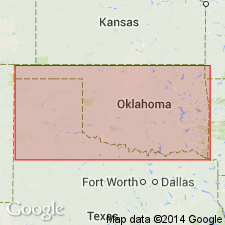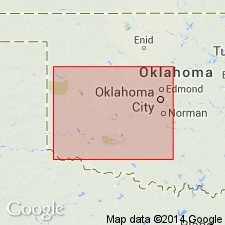
- Usage in publication:
-
- Chaney gypsum
- Modifications:
-
- Named
- Dominant lithology:
-
- Gypsum
- AAPG geologic province:
-
- Palo Duro basin
- South Oklahoma folded belt
Summary:
Named as a part (one of six named parts) of Greer division for the Chaney salt plain on Elm Fork of the Red River in Harmon[?] Co, OK four miles east of the TX line in the Palo Duro basin. No type locality designated. Is well exposed from Mangum, Greer Co in the South Oklahoma folded belt province to the TX line. Composed of hard, massive, white to gray or bluish gypsum 3 to 5 ft thick. Can be cross-bedded. Stratified. Is overlain and underlain by unnamed shale in the Greer. Permian age.
Source: GNU records (USGS DDS-6; Denver GNULEX).

- Usage in publication:
-
- Chaney gypsum member†
- Modifications:
-
- Abandoned
Summary:
Chaney gypsum member of Greer formation presumably abandoned, because Greer formation is abandoned in this report. For the so-called "eastern area" of the Greer, the name Cloud Chief formation is proposed. It is shown that the rocks in the "western area" of the Greer belong to Blaine, Dog Creek, Whitehorse, and Cloud Chief (new) formations. [Chaney, Kiser, Haystack, Cedartop, Collingsworth, and Mangum, formerly members of the Greer, are presumably also abandoned.] The report area, in southwestern Oklahoma, includes all or parts of 10 counties east, northeast, north, northwest and west of the Wichita Mountains, in the S. Oklahoma folded belt province and Anadarko basin. The new classification of the Permian of this area is as follows (ascending): Duncan sandstone (new), Chickasha formation (new), Blaine gypsum (revised), Dog Creek shale (rank raised), Whitehorse sandstone (rank raised), Day Creek dolomite (rank raised), Cloud Chief formation (new), and Quartermaster formation (revised). All of these units are stratigraphic equivalents of the Double Mountain, the uppermost Permian division of Texas. Age is Permian. Report includes geologic map.
[According to US geologic names lexicon, USGS Bull. 896 (p. 398), Gould "...did not reassign the Kiser and Chaney gypsums to the Greer (=Cloud Chief Gypsum) or to the Blaine. They are now, however, classified as members of Blaine formation by the U.S. Geol. Survey..."]
Source: Modified from GNU records (USGS DDS-6; Denver GNULEX).
For more information, please contact Nancy Stamm, Geologic Names Committee Secretary.
Asterisk (*) indicates published by U.S. Geological Survey authors.
"No current usage" (†) implies that a name has been abandoned or has fallen into disuse. Former usage and, if known, replacement name given in parentheses ( ).
Slash (/) indicates name conflicts with nomenclatural guidelines (CSN, 1933; ACSN, 1961, 1970; NACSN, 1983, 2005, 2021). May be explained within brackets ([ ]).

